By Ed Pierce
Managing Editor
My parents didn’t believe in giving their children an allowance and it was never easy to scrape together enough money to go Christmas shopping for gifts for my family each year.
Once I turned 12 though, that problem was resolved, although trying to find suitable presents for three people for $15 was a significant challenge. It amounted to spending no more than $5 per person and even in the 1960s, that wasn’t a large budget for gift-giving.
The reason that I suddenly had money at all was the result of being able to work after school let out delivering the afternoon newspaper in my neighborhood. I would make my collection route on Saturdays and if I raised enough to pay for the newspapers I delivered that week, tips I received were considered as my profit.
After a few months of chasing down residents to pay for their newspaper deliveries, I found that the best time to make collections was at suppertime on Saturdays. People tended to be home at that time and seemed willing to answer the door then.
With more than 100 newspaper subscribers on my neighborhood route, making collections was time-consuming and work best suited for an accountant. There would be weeks where nobody was home during my collection time, or they didn’t have change for a $100 bill, or if they were home and the lights were on inside, they simply didn’t answer the door.
It always seemed that I was constantly behind on my collections and making a profit was next to impossible. To make sure my newspaper bill was paid, I’d have to ask my father for a short-term loan to make up the difference I lacked, and he’d inevitably ask me why I couldn’t collect what was owed to me by the subscribers.
One Christmas, however, things changed dramatically. It was December 1967 and a subscriber on my newspaper route invited me inside his home when I was making a collection. He told me that he was a reporter for a local television station and asked me what I like the most about delivering newspapers.
When I mentioned to him that I read the newspaper every day and wanted to become a journalist someday after attending college, he was overjoyed. He asked me about delivering newspapers and I mentioned how difficult it was to keep track of subscriber’s accounts and then having to collect the money for their bills every week.
He then reached into his wallet and gave me a $50 bill which he said was a tip for outstanding service throughout the year and he mentioned that when I got ready to choose a college for journalism, he could advise my father and I about what things to watch for or avoid in the application process for journalism schools.
That Saturday my collections went smoothly, and the $50 tip helped me net a profit that week of $25, which was more than enough to make a trip to the store for Christmas shopping that coming week. It also helped me repay my father for a newspaper bill shortage of $5 that I had borrowed from him for the previous week.
The next weekend my father dropped me off at a shopping complex and the first store I shopped at was a candy shop. I found a wrapped box of assorted chocolates for $3.95 for my mother and then at a nearby home improvement store, I purchased a large flashlight for my father for $3.99. For a donation of 25 cents, outside the store I was able to have the flashlight box gift-wrapped by some Girl Scouts.
At the toy store, I found a Matchbox car carrying case for my younger brother for $4 and took it back to the Girl Scouts to wrap it for another 25 cents. I returned home and counted my change and to my pleasant surprise, all my Christmas purchases amounted to $12.44, leaving me a total of $7.56 left over.
I decided to save that money for the next time I was short on my newspaper collections so that I wouldn’t have to ask my father for a loan that week.
My family was grateful for their Christmas gifts and enjoyed spending time together over the holidays.
The following fall I moved on to attend high school and gave up my paper route to attend sports practices after school. By then the route had grown to more than 250 subscribers and I could no longer fit all the papers for delivery into the carrying racks I had installed on the back of my bicycle.
The subscriber who gave me the huge tip was Tom Schell, who went on to become the anchor for a while on the evening news for the ABC affiliate station in my hometown. In the 1970s he became better known nationally as a reporter and correspondent for ABC’s popular “20-20” Friday-evening program hosted by Hugh Downs and Barbara Walters.
I was able to eventually earn my degree in journalism and have had a long career working for newspapers. But it all began in my neighborhood as a teenager delivering papers on my bicycle. <



No comments:
Post a Comment